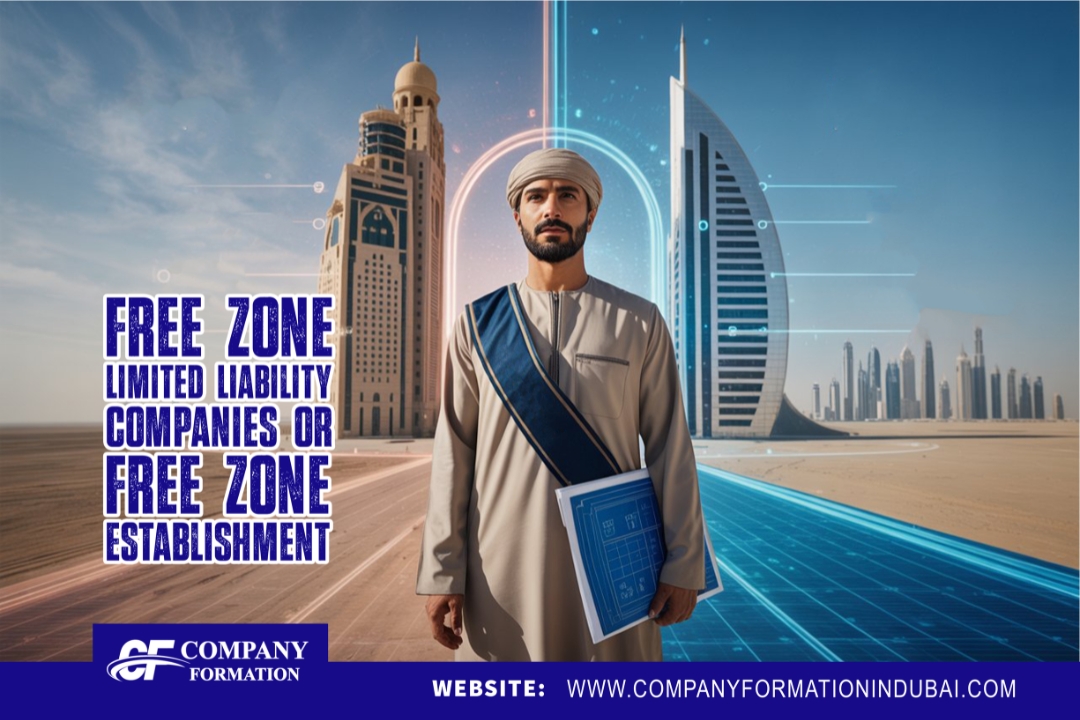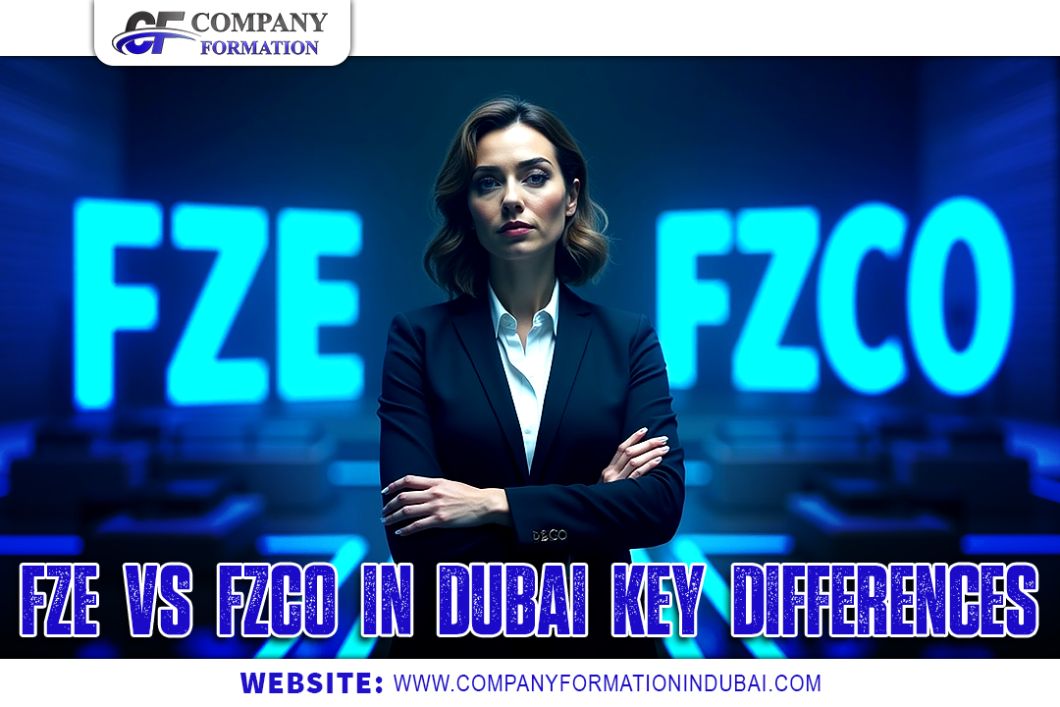Free Zone Limited Liability Companies or Free Zone Establishment | Guide to Business Setup in Dubai
A Free Zone Establishment (FZE) is beneficial for single owners because it is a single-shareholder company that offers limited liability and full control. Partnerships or new companies looking for investors will benefit from an FZCO, or Free Zone Limited Liability Company, which accommodates 2–50 shareholders. While both structures enable full foreign ownership, tax incentives, and ease of registration in Dubai, they differ in capital requirements, ownership structure, flexibility for growth, and other growth factors.
This guide will help you understand these differences, the complex setup processes, and how to determine the best structure for your company in the 2025 UAE business setup.
Dubai has been the best choice for new businesses and entrepreneurs because it concentrates so much on the business sector. If you are planning a tech startup, an e-commerce business, or even a consultancy, Dubai Free Zones will give you… tax exemptions, no need for sponsors, and simple procedures. However, the choice between a Free Zone Establishment (FZE) and a Free Zone Company (FZCO) can be so complicated. Just like you, I spent numerous hours figuring out the best structure for my Dubai venture. In this article, I will provide you with everything to make the best choice, such as cost, regulation, and even simulations, so you won’t be as confused as I was.
What is a Free Zone Establishment (FZE)?
A Free Zone Establishment (FZE) is a company with a single shareholder that is incorporated in one of Dubai’s Free Zones. It is meant for sole traders or corporate entities who wish to have complete control of their business incorporated in Dubai. An FZE grants limited liability, so personal assets are protected, and there is no local partner required for 100% foreign ownership. FZEs are suitable for professionals looking to launch a small trading or consultancy business. It is a simple method to begin your business setup in the UAE.
Key Features of an FZE
- Single Shareholder: Ownership is in the form of an individual or corporate entity, which allows them to control operations fully.
- Limited Liability: Your assets are protected; liability is limited to the company’s share capital.
- 100% Foreign Ownership: No need for a UAE national sponsor, making it ideal for international entrepreneurs.
- Wizard Setup: An FZE is easier to set up, as there are fewer documents required and lower capital is needed in comparison to a multi-shareholder structure.
- No taxation: corporate tax of 0% on qualifying income and no duty on imports and exports.
Who Should Choose an FZE?
An FZE is suitable for you if you are an individual entrepreneur or a small business owner looking for governance simplicity and control. Say you want to set up an e-commerce store and you want to manage everything yourself. An FZE will allow you to control everything and will not have to deal with cumbersome structural governance issues. This is also optimal for wider business populations such as freelance consultants and single-owner companies looking to take advantage of Dubai free zones’ tax exemptions and remote business registration.
What is a Free Zone Company (FZCO or FZ-LLC)?
A Free Zone Company, or FZCO, also referred to as a Free Zone Limited Liability Company (FZ-LLC), is a form of multi-shareholder company consisting of 2-50 shareholders. It is suitable for joint venture partnerships, co-founder startups, or companies looking for sponsors. FZCO shares many features with FZE companies. For instance, shareholders enjoy limited liability, 100 percent foreign ownership, and tax incentives. However, FZCO’s ability to have multiple shareholders makes it a better choice for joint ventures. In FZCO companies, it is possible to launch a trading company or a fintech startup as well as attract investment.
Key Characteristics of FZCO
- FZCO grants 2-50 shareholders who can be individuals or corporate entities, thus enabling flexible ownership.
- Shareholders’ personal property is kept separate from their FZCO’s debts.
- For foreign investors, FZCO entails no local sponsor, thus enabling 100 percent foreign ownership.
- FZCO supports varied activities like trading, servicing, or even manufacturing in Free Zones, thus enabling flexible operations.
- FZCO makes it simpler to bring in new shareholders or investors, thus increasing its appeal for expansion.
Who Should Pick an FZCO?
An FZCO suits best for startups with multiple co-founders or businesses that are planning to expand or seek venture capital or funding. If you are trying to establish a tech venture with co-founders or planning to get funding, an FZCO will suitably allow sharing equity via its shareholder structure. JVs will also find it suitable, along with businesses planning to expand fast in Dubai’s vibrant startup scene.
FZE vs FZCO: Key Differences
When choosing between an FZE and FZCO, it’s essential to know their key distinctions. Both provide limited liability and tax advantages, but one is an FZE and the other an FZCO, which means their American operating structures differ. Let’s explore the nuances to address the pivotal inquiry: what distinguishes FZEs and FZCOs?
Number of Shareholders
- FZE: Tailored to a single shareholder, hence best suited for individual entrepreneurs or sole corporate affiliates.
- FZCO: Accommodates 2 to 50 shareholders, tailored for partnerships and projects post angel-investor acquisition.
Business Structure and Governance
- FZE: Unilateral decision-making streamlines governance, making the business structure less complicated.
- FZCO: Because governance needs to be defined for such firms, it introduces an additional layer of governance complexity, which is a shareholder agreement to outline the governance structure.
Capital Requirements
- FZE: Typically lower minimum capital requirement, such as AED 50,000 in DMCC, thus more accessible for small businesses.
- FZCO: Some Free Zones, for example, DUQE, allow flexible formulations without full capital paid upfront, so higher minimum capital due to multiple shareholders is mitigated by flexible full capital requirement options.
Growth and Investment Flexibility
- FZE: Growth is limited, and so is the acquisition of additional shareholders; conversion to FZCO is an option, but it means additional processes to go through.
- FZCO: More flexible scalability, investor acquisition, and business reorganization, hence better suited for ambitious startups.
| Aspect | FZE | FZCO/FZ-LLC |
|---|---|---|
| Shareholders | Single (individual or corporate) | 2–50 (individuals or corporate) |
| Liability | Limited to share capital | Limited to share capital |
| Ownership | 100% foreign ownership | 100% foreign ownership |
| Setup Complexity | Simple, fewer documents | More complex, requires shareholder agreement |
| Best For | Solo entrepreneurs, small businesses | Partnerships, startups with investors |
Benefits of Free Zone Companies in Dubai
Why choose a Free Zone for your business setup in Dubai? Dubai’s Free Zones offer unmatched advantages, making them a top choice for entrepreneurs worldwide. From tax incentives to remote registration, here’s why Free Zone companies in the UAE are so appealing.
Tax Advantages and Incentives
- 0% Corporate Tax: Qualifying Free Zone companies enjoy a 0% tax rate on profits, provided they meet Economic Substance Regulations (ESR) and avoid significant mainland trade.
- No Import/Export Duties: Exemptions from customs duties reduce costs for trading businesses.
- No Personal Income Tax: Entrepreneurs keep more of their earnings, boosting profitability.
Simplified Business Setup
- Remote Registration: Many Free Zones, like DUQE, allow you to complete business registration in Dubai online, saving time and travel costs.
- PRO Services: Business setup consultants in Dubai streamline licensing, visa processing, and compliance, reducing administrative hassle.
- Flexible Office Solutions: Options like flexi-desks or virtual offices lower setup costs compared to mainland requirements.
Access to Global Markets
- International Trade: Free zones facilitate international trade with streamlined logistics and access to ports like Jebel Ali.
- UAE Golden Visa: Eligible entrepreneurs can secure long-term residency, enhancing stability for the UAE business setup.
- Corporate Bank Accounts: Free Zone companies can open a bank account in the UAE, though some banks require financial due diligence.
How to Set Up an FZE or FZCO in Dubai
Setting up an FZE or FZCO in a Dubai Free Zone is straightforward but requires careful planning. Here’s a step-by-step guide to help you navigate the company formation in Dubai.
Step-by-Step Setup Process
Step 1: Choose a Free Zone:
Select a Free Zone that aligns with your business activities (e.g., DMCC for trading, DUQE for startups). Each has unique benefits and licensing requirements.
Step 2: Select Your Structure:
Decide between an FZE (single shareholder) or FZCO (multiple shareholders) based on your ownership and growth plans.
Step 3: Submit Application:
Provide documents like passport copies, a business plan, and trade name preferences. For FZCOs, include a shareholder agreement.
Step 4: Sign Legal Documents:
Complete the Memorandum of Association (MoA) and Articles of Association (AoA) to outline your shareholder structure and capital requirements.
Step 5: Secure a Lease Agreement:
Choose a flexi-desk, virtual office, or physical office space as required by the Free Zone Authority.
Step 6: Obtain Your License:
Pay registration fees and receive your trade license, allowing you to operate legally.
Step 7: Apply for Visas:
Use your establishment card to sponsor UAE Golden Visas for yourself and employees.
Step 8: Open a Bank Account:
Work with business setup consultants to open a bank account in the UAE, ensuring compliance with banking regulations.
2025 Cost Breakdown
Costs for Dubai Free Zone company setups vary by Free Zone and structure. Here’s an approximate breakdown for 2025:
- Registration Fees: AED 10,000–20,000 (varies by Free Zone like DMCC or DUQE).
- License Fees: AED 15,000–50,000 annually, depending on activities (e.g., commercial, professional).
- Capital Requirements:
- FZE: AED 50,000 (DMCC) to AED 150,000 (JAFZA), often declared without full payment.
- FZCO: Similar range, but higher if multiple shareholders contribute.
- Office Space: Flexi-desks start at AED 5,000/year; private offices range from AED 20,000 to 50,000/year.
- Visa Costs: AED 3,000–5,000 per visa, including Emirates ID and medical tests.
- PRO Services: AED 5,000–15,000 for assistance with business registration and compliance.
Choosing the Right Free Zone for Your Business
With over 30 free zones in Dubai, selecting the right one is key to your success. Each free zone caters to specific industries and offers unique perks. Here’s a look at some popular options and why DUQE Free Zone stands out.
Popular Dubai Free Zones
- DMCC (Dubai Multi Commodities Centre): Ideal for trading and commodities, with flexible capital requirements (AED 50,000) and robust infrastructure.
- JAFZA (Jebel Ali Free Zone): Perfect for logistics and manufacturing, with access to Jebel Ali Port and higher capital requirements (AED 150,000).
- Dubai Airport Free Zone (DAFZ): Suited for aviation and logistics, with low capital requirements (AED 1,000).
- Dubai CommerCity: Tailored for e-commerce businesses, offering digital trade support and sector-specific approvals.
- Sharjah Free Zones: Cost-effective options like Sharjah Airport International Free Zone, ideal for small businesses.
- RAKEZ (Ras Al Khaimah Economic Zone): Affordable setup with flexible licensing for diverse industries.
Why Consider DUQE Free Zone?
DUQE Free Zone, located aboard the iconic QE2, is a startup-friendly hub with a focus on innovation. It offers:
- Startup Ecosystem: Incubation programs, mentorship, and regulatory sandboxes for fintech, AI, and blockchain ventures.
- Flexible Packages: Affordable flexi-desks and tailored licensing for FZE and FZCO setups.
- Simplified Compliance: Streamlined processes for trade name approval, licensing, and corporate tax filings.
Which free zone is best for startups in 2025?
DUQE is a top choice for tech startups due to its innovation focus, while DMCC suits trading businesses, and JAFZA excels in logistics. Your choice depends on your industry and budget.
Rules You Must Follow to Start a Free Zone Company in the UAE
If you want to start a company in a UAE Free Zone, there are some important rules to follow. Knowing these rules helps you run your business the right way.
Licenses and Paperwork
- Trade License: Every company needs a license. The Free Zone gives it to you based on what your business does (like selling, services, or making products).
- Documents Needed: You’ll need passport copies, a business plan, and company papers. If more than one person owns the business, you’ll also need a board agreement. Big companies must show proof they exist.
- Extra Approvals: Some jobs, like healthcare, media, or finance, need special permission from UAE government offices.
- Office Space: You must have a lease (rental) agreement. You can choose small spaces like a flexi-desk or even a virtual office.
Taxes and Business Rules
- Corporate Tax: Since 2023, businesses making more than AED 375,000 in profit must pay 9% tax. But Free Zone companies can pay 0% if they follow the rules and don’t trade on the mainland.
- Economic Substance Rules (ESR): Some businesses, like those holding money or ideas (IP), must show they really exist. This means having an office and staff. They also need to send reports each year.
- UBO (Ultimate Beneficial Owner): You must tell the Free Zone who really owns the business. This helps with honesty and safety.
Using PRO services can make all this easier. They help with tax registration, financial reports, and license renewals.
Real-World Scenarios: FZE vs FZCO
To help you decide, let’s explore two fictional scenarios based on common entrepreneur pain points. These examples show how FZE and FZCO structures work in practice.
Scenario 1: Solo Entrepreneur’s E-Commerce Venture
Lina, a graphic designer from Canada, wants to launch an e-commerce store selling custom art prints to global clients. She values full control and prefers a low-cost setup. After researching Dubai Free Zone company setup costs, she chose an FZE in Dubai CommerCity.
- Why FZE? Lina is the sole owner, so an FZE’s single-shareholder structure suits her needs for simplicity and control. The low capital requirement (AED 50,000, not fully paid upfront) and tax exemptions keep costs down.
- Setup Process: She submits her passport, a business plan, and trade name preferences online. With PRO Services, she secures a trade license, a flexi-desk, and a UAE Golden Visa in two weeks.
- Outcome: Lina’s business thrives, leveraging Dubai CommerCity’s e-commerce infrastructure. She later considers converting to an FZCO if she attracts investors.
Scenario 2: Fintech Startup with Co-Founders
Ahmed, Sarah, and Priya, three co-founders from the UAE, UK, and India, are launching a fintech app in DUQE Free Zone. They need a structure that supports their partnership and future funding rounds.
- Why FZCO? An FZCO allows multiple shareholders, letting them split equity (40%, 30%, 30%). The structure supports their plan to pitch to venture capitalists in Dubai’s startup ecosystem.
- Setup Process: They submit a shareholder agreement, MoA/AoA, and passports, choosing a regulatory sandbox license for fintech. PRO Services helps them open a bank account and secure visas.
- Outcome: Their FZCO benefits from DUQE’s incubation programs, attracting investors and scaling rapidly while maintaining limited liability.
FAQs About FZE and FZCO in Dubai
Q1: What is the difference between an FZE and an FZCO in Dubai?
An FZE is a single-shareholder company for solo entrepreneurs, offering full control and a simpler setup. An FZCO (or FZ-LLC) allows 2–50 shareholders, ideal for partnerships or startups seeking investors. Both provide 100% foreign ownership, limited liability, and tax benefits, but FZCOs offer more flexibility for growth.
Q2: What is the cost of setting up an FZE in Dubai in 2025?
FZE setup costs range from AED 15,000–50,000, including registration (AED 10,000–20,000), license fees (AED 15,000–30,000), and flexi-desk (AED 5,000/year). Capital requirements (e.g., AED 50,000 in DMCC) vary by free zone.
Q3: What is the difference between an FZE, FZCO, and LLC?
An FZE has one shareholder and operates in a Free Zone with 100% foreign ownership. An FZCO supports multiple shareholders with similar Free Zone benefits. A mainland LLC requires a UAE national sponsor (51% ownership, though some sectors allow 100%) and can trade freely in the UAE.
Q4: Which Free Zone is best for startups in 2025?
DUQE Free Zone is ideal for tech startups due to its startup ecosystem and incubation programs. DMCC suits trading, JAFZA is great for logistics, and Dubai CommerCity excels for e-commerce.
Q5: How do I convert an FZE to an FZCO in Dubai?
To convert an FZE to an FZCO, submit a board resolution, share purchase agreement, and updated MoA/AoA to the Free Zone Authority. You’ll need approval and may incur fees (AED 5,000–10,000).
Conclusion
Choosing between an FZE and an FZCO is an important step when starting a business in Dubai. If you’re working alone, like Lina, an FZE is simple and gives you full control. If you have partners, like Ahmed, Sarah, and Priya, an FZCO is better for working as a team and bringing in money from others. Both options let you own your business fully, pay no corporate tax, and start your company from anywhere.
To make things easy, work with business setup consultants in Dubai. They can help you with licenses, paperwork, and rules. Free zones like DMCC, JAFZA, and DUQE are great places to grow your business. Ready to begin? Take the first step and make your business dream come true!





